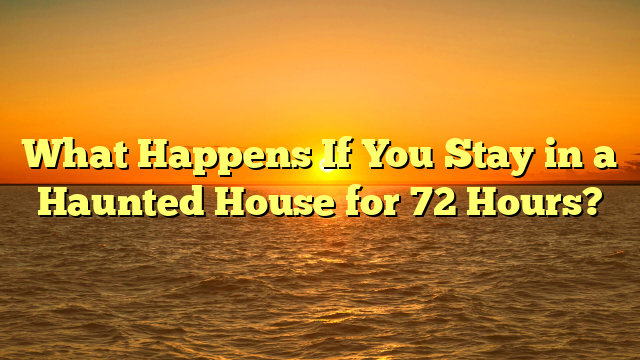## 72 Hours in a Haunted House: A Dare You Shouldn’t Take
The allure of the paranormal is undeniable. Whispers of ghostly encounters, chilling tales of unexplained phenomena – it all adds up to a powerful cocktail of fear and fascination. For some, this fascination translates into a morbid curiosity: what would it be like to spend three entire days and nights in a house reputed to be haunted? While reality TV shows frequently exploit this morbid curiosity, the reality of a 72-hour stay in a haunted house is far more complex and potentially dangerous than the edited spectacle. Let’s delve into what could potentially happen – both physically and psychologically – if you dare to spend that much time in a supposedly haunted location.
### The Psychological Toll: More Than Just Jump Scares
Even before the first alleged paranormal event, the psychological pressure starts to build. The isolation itself is a significant factor. Confined to a space associated with death, tragedy, or unexplained events, the mind naturally begins to play tricks on itself. Ambiguous sounds become footsteps, shadows morph into figures, and the normal creaks and groans of an old house become sinister whispers. This heightened state of anxiety can lead to:
* Sleep Deprivation: The constant state of hyper-vigilance makes it almost impossible to get restful sleep. Even brief periods of slumber can be punctuated by sudden jolts and terrifying dreams, further exacerbating stress and mental fatigue. This sleep deprivation can lead to impaired judgment, increased paranoia, and heightened emotional reactivity.
* Paranoia and Hallucinations: Prolonged exposure to a stressful and unsettling environment can trigger or worsen existing mental health conditions. The brain, desperate for explanation in the face of the unknown, may begin to create its own, resulting in vivid hallucinations and delusional thinking. What appears to be a ghostly figure could simply be a trick of the light, but in this heightened state, the mind will readily accept the paranormal explanation.
* Stress and Anxiety Disorders: The cumulative effect of fear, isolation, and sleep deprivation can trigger or exacerbate anxiety disorders, leading to panic attacks, heightened heart rate, shortness of breath, and overwhelming feelings of dread. This can have lasting consequences long after leaving the haunted house.
### The Physical Risks: Beyond the Spectral
While ghosts remain firmly in the realm of speculation, the very real dangers of a haunted house are numerous. Neglecting basic safety precautions in an isolated location can lead to serious physical consequences:
* Exposure to Hazards: Many purportedly haunted houses are dilapidated and unsafe. Loose floorboards, crumbling walls, broken glass, and exposed wiring pose significant risks of injury. The lack of modern amenities means exposure to the elements, resulting in hypothermia or heatstroke depending on the season.
* Lack of Medical Assistance: In the event of an accident or a sudden onset of a psychological crisis, accessing medical assistance can be significantly delayed or even impossible. The remoteness of many haunted locations exacerbates this risk.
* Environmental Hazards: Depending on the location, there could be exposure to dangerous wildlife, poisonous plants, or contaminated water sources. These risks are easily overlooked in the thrill of the paranormal investigation but can have serious, long-term consequences.
### The Potential for the “Paranormal”: Separating Fact from Fiction
Let’s address the elephant in the room: the potential for genuine paranormal experiences. While many “haunted” experiences can be explained by natural phenomena or psychological factors, some individuals do report genuine encounters that defy rational explanation. These experiences can be deeply disturbing and emotionally traumatic, potentially leading to:
* Post-Traumatic Stress Disorder (PTSD): The sheer terror of a perceived paranormal encounter can trigger PTSD, resulting in flashbacks, nightmares, avoidance behaviours, and chronic anxiety.
* Long-term Psychological Damage: The lasting effects of a deeply unsettling paranormal experience can be profound and long-lasting, significantly impacting mental health and overall well-being.
### Conclusion: Curiosity Can Kill… or at Least Seriously Stress You Out
The allure of spending 72 hours in a haunted house is undeniably strong, fueled by a desire for thrilling adventure and the potential for the extraordinary. However, the potential risks – both physical and psychological – far outweigh any potential rewards. The experience is far more likely to result in sleep deprivation, extreme anxiety, and potentially long-term mental health issues than a chilling encounter with a spectral resident. While investigating the paranormal can be fascinating, prioritize your safety and well-being. There are safer, more responsible ways to explore the mysteries of the unknown. Perhaps a documentary, a well-researched book, or a ghost tour would be a better starting point. Your mental health will thank you for it.

